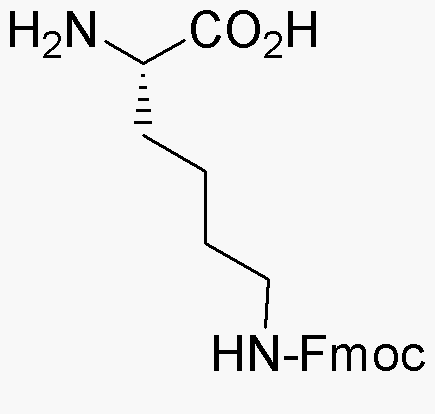Ne-Fmoc-L-lysine is widely utilized in research focused on:
- Peptide Synthesis: This compound serves as a key building block in the synthesis of peptides, particularly in solid-phase peptide synthesis, allowing for the creation of complex and diverse peptide sequences.
- Drug Development: It plays a significant role in the development of peptide-based therapeutics, which are increasingly important in treating various diseases, including cancer and metabolic disorders.
- Bioconjugation: Ne-Fmoc-L-lysine is used in bioconjugation strategies, enabling researchers to attach biomolecules to surfaces or other molecules, enhancing the functionality of diagnostic and therapeutic agents.
- Protein Engineering: This compound aids in the modification of proteins, allowing scientists to explore structure-function relationships and develop proteins with tailored properties for specific applications.
- Research in Neuroscience: It is utilized in the study of neuropeptides, contributing to the understanding of neurotransmission and potential treatments for neurological disorders.
General Information
Properties
Safety and Regulations
Applications
Ne-Fmoc-L-lysine is widely utilized in research focused on:
- Peptide Synthesis: This compound serves as a key building block in the synthesis of peptides, particularly in solid-phase peptide synthesis, allowing for the creation of complex and diverse peptide sequences.
- Drug Development: It plays a significant role in the development of peptide-based therapeutics, which are increasingly important in treating various diseases, including cancer and metabolic disorders.
- Bioconjugation: Ne-Fmoc-L-lysine is used in bioconjugation strategies, enabling researchers to attach biomolecules to surfaces or other molecules, enhancing the functionality of diagnostic and therapeutic agents.
- Protein Engineering: This compound aids in the modification of proteins, allowing scientists to explore structure-function relationships and develop proteins with tailored properties for specific applications.
- Research in Neuroscience: It is utilized in the study of neuropeptides, contributing to the understanding of neurotransmission and potential treatments for neurological disorders.
Documents
Safety Data Sheets (SDS)
The SDS provides comprehensive safety information on handling, storage, and disposal of the product.
Product Specification (PS)
The PS provides a comprehensive breakdown of the product’s properties, including chemical composition, physical state, purity, and storage requirements. It also details acceptable quality ranges and the product's intended applications.
Certificates of Analysis (COA)
Search for Certificates of Analysis (COA) by entering the products Lot Number. Lot and Batch Numbers can be found on a product’s label following the words ‘Lot’ or ‘Batch’.
Numéro de catalogue
Numéro de lot/série
Certificates Of Origin (COO)
This COO confirms the country where the product was manufactured, and also details the materials and components used in it and whether it is derived from natural, synthetic, or other specific sources. This certificate may be required for customs, trade, and regulatory compliance.
Numéro de catalogue
Numéro de lot/série
Safety Data Sheets (SDS)
The SDS provides comprehensive safety information on handling, storage, and disposal of the product.
DownloadProduct Specification (PS)
The PS provides a comprehensive breakdown of the product’s properties, including chemical composition, physical state, purity, and storage requirements. It also details acceptable quality ranges and the product's intended applications.
DownloadCertificates of Analysis (COA)
Search for Certificates of Analysis (COA) by entering the products Lot Number. Lot and Batch Numbers can be found on a product’s label following the words ‘Lot’ or ‘Batch’.
Numéro de catalogue
Numéro de lot/série
Certificates Of Origin (COO)
This COO confirms the country where the product was manufactured, and also details the materials and components used in it and whether it is derived from natural, synthetic, or other specific sources. This certificate may be required for customs, trade, and regulatory compliance.


